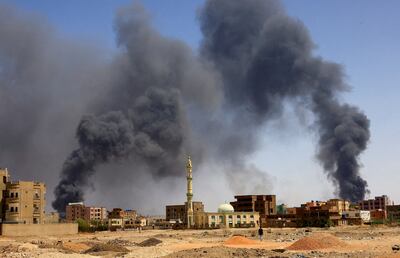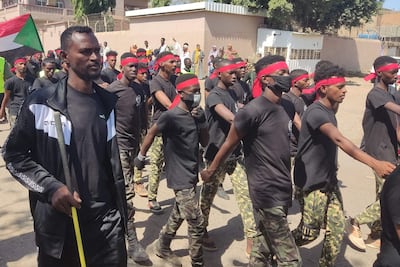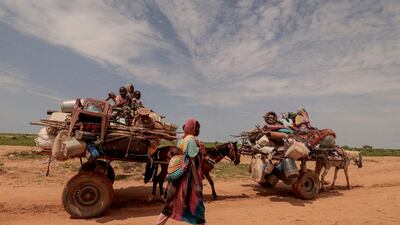The army in Sudan has rejected a truce in its war against a rival paramilitary during Ramadan, dashing hopes that humanitarian assistance could be delivered to the nation where an estimated 18 million people face acute hunger.
Sudan descended into civil conflict in last April after clashes broke out in the capital Khartoum between the military, led by Gen Abdel Fattah Burhan, and the paramilitary group known as the Rapid Support Forces (RSF), commanded by Gen Mohamed Dagalo.
Hopes for a truce were raised at the weekend after the UN Security Council adopted a resolution calling for a ceasefire to coincide with Ramadan, which began on Monday.
The UK-drafted resolution also called on the warring sides to enable the delivery of humanitarian aid to the millions of Sudanese facing hunger.
But the army rejected any truce with the RSF, formerly known as the Janjaweed militia, unless it surrendered the territory it has captured from the army.
“No negotiations with the Janjaweed, whether in Ramadan or any other time, before their complete surrender,” said Gen Yasser Al Attah in a speech at a ceremony marking the completion of basic military training by more than 1,000 volunteers in the eastern city of Kassala.
Gen Al Attah said the army would not heed the call for a truce until the RSF had withdrawn from the capital Khartoum and the western regions of Darfur and Kordofan, as well as Al Jazeera to the south of the capital.
The RSF had welcomed the UN resolution but reports emerged of continued fighting in eastern Sudan on Monday.
A series of ceasefires brokered by Saudi Arabia and the US in the early days of the war were ignored or proved short-lived, with both sides seemingly determined to fight on until victory.
The army has generally fared poorly against the RSF during the war, losing much of Khartoum and a string of cities in the west and south of the capital. However, it appears to have recently regained the initiative with strategic battlefield victories in Omdurman in the greater Khartoum area.
The fighting has destroyed much of the capital and displaced about eight million people nationwide. In Sudan's outer regions, each side has accused the other of war crimes against civilians.
The war has also led to a hunger crisis in Sudan.
The UN's World Food Programme said in a report last month that at least 25 million people across the country and in neighbouring South Sudan and Chad are struggling with soaring rates of hunger and malnutrition due to the war.
The UN agency previously warned that 18 million people were "acutely food insecure" and about 5 million faced starvation.
“Unless this conflict is resolved, unfettered access is granted to humanitarian agencies and funding is received, this crisis will only worsen,” Michael Dunford, the WFP's regional director for Eastern Africa, said in the report.
Unicef, the UN’s women and children agency, has warned the war is pushing Sudan towards famine and a catastrophic loss of life, especially among the young.
Severe malnutrition in children is intensifying beyond its worst projections and there have been outbreaks of cholera, measles and malaria, Unicef said in a report this month.
“There is also evidence of spikes in malnutrition-related child deaths, particularly among the displaced,” it added.
Gen Al Burhan and his one-time ally Gen Dagalo have each sought foreign support and embarked on trips abroad, including to regional heavyweights Egypt and Ethiopia.
Both men have presented themselves as the legitimate leader of Sudan and argued they were fighting to restore the country's democratic transition and bring prosperity.
However, many in Sudan see the war as simply a struggle for political and military supremacy between two generals.
The pair are widely held responsible for indirectly igniting the war when they jointly staged a coup in October 2021 that toppled a civilian-led government that was leading the country’s democratic transition after the removal of dictator Omar Al Bashir in 2019.
The coup plunged the nation into its worst economic crisis in living memory and created a security vacuum that rekindled deadly ethnic rivalries in outlying regions. More than 100 anti-coup protesters were killed by security forces in the months that followed the power grab.
The specs: 2018 Mercedes-Benz E 300 Cabriolet
Price, base / as tested: Dh275,250 / Dh328,465
Engine: 2.0-litre four-cylinder
Power: 245hp @ 5,500rpm
Torque: 370Nm @ 1,300rpm
Transmission: Nine-speed automatic
Fuel consumption, combined: 7.0L / 100km
RESULTS
%3Cp%3E%0D5pm%3A%20Al%20Bateen%20%E2%80%93%20Maiden%20(PA)%20Dh80%2C000%20(Turf)%202%2C200m%0D%3Cbr%3EWinner%3A%20Ma%E2%80%99Aly%20Al%20Shahania%2C%20Bernardo%20Pinheiro%20(jockey)%2C%20Mohamed%20Daggash%20(trainer)%0D%3Cbr%3E5.30pm%3A%20Al%20Khaleej%20%E2%80%93%20Maiden%20(PA)%20Dh80%2C000%20(T)%201%2C400m%0D%3Cbr%3EWinner%3A%20AF%20Rami%2C%20Tadhg%20O%E2%80%99Shea%2C%20Ernst%20Oertel%0D%3Cbr%3E6pm%3A%20Wathba%20Stallions%20Cup%20%E2%80%93%20Handicap%20(PA)%20Dh70%2C000%20(T)%201%2C400m%0D%3Cbr%3EWinner%3A%20Bant%20Al%20Emarat%2C%20Bernardo%20Pinheiro%2C%20Qaiss%20Aboud%0D%3Cbr%3E6.30pm%3A%20Al%20Nahyan%20%E2%80%93%20Handicap%20(PA)%20Dh80%2C000%20(T)%201%2C600m%0D%3Cbr%3EWinner%3A%20AF%20Rasam%2C%20Marcelino%20Rodrigues%2C%20Ernst%20Oertel%0D%3Cbr%3E7pm%3A%20Al%20Karamah%20%E2%80%93%20Handicap%20(PA)%20Dh80%2C000%20(T)%201%2C600m%0D%3Cbr%3EWinner%3A%20Zafaranah%2C%20Bernardo%20Pinheiro%2C%20Musabah%20Al%20Muhairi%0D%3Cbr%3E7.30pm%3A%20Al%20Salam%20%E2%80%93%20Handicap%20(TB)%20Dh80%2C000%20(T)%201%2C400m%0D%3Cbr%3EWinner%3A%20Nibras%20Passion%2C%20Tadhg%20O%E2%80%99Shea%2C%20Ismail%20Mohammed%3C%2Fp%3E%0A
Oscars in the UAE
The 90th Academy Awards will be aired in the UAE from 3.30am on Monday, March 5 on OSN, with the ceremony starting at 5am
Specs
Engine: Dual-motor all-wheel-drive electric
Range: Up to 610km
Power: 905hp
Torque: 985Nm
Price: From Dh439,000
Available: Now
CHATGPT%20ENTERPRISE%20FEATURES
%3Cp%3E%E2%80%A2%20Enterprise-grade%20security%20and%20privacy%3C%2Fp%3E%0A%3Cp%3E%E2%80%A2%20Unlimited%20higher-speed%20GPT-4%20access%20with%20no%20caps%3C%2Fp%3E%0A%3Cp%3E%E2%80%A2%20Longer%20context%20windows%20for%20processing%20longer%20inputs%3C%2Fp%3E%0A%3Cp%3E%E2%80%A2%20Advanced%20data%20analysis%20capabilities%3C%2Fp%3E%0A%3Cp%3E%E2%80%A2%20Customisation%20options%3C%2Fp%3E%0A%3Cp%3E%E2%80%A2%20Shareable%20chat%20templates%20that%20companies%20can%20use%20to%20collaborate%20and%20build%20common%20workflows%3C%2Fp%3E%0A%3Cp%3E%E2%80%A2%20Analytics%20dashboard%20for%20usage%20insights%3C%2Fp%3E%0A%3Cp%3E%E2%80%A2%20Free%20credits%20to%20use%20OpenAI%20APIs%20to%20extend%20OpenAI%20into%20a%20fully-custom%20solution%20for%20enterprises%3C%2Fp%3E%0A
How to wear a kandura
Dos
- Wear the right fabric for the right season and occasion
- Always ask for the dress code if you don’t know
- Wear a white kandura, white ghutra / shemagh (headwear) and black shoes for work
- Wear 100 per cent cotton under the kandura as most fabrics are polyester
Don’ts
- Wear hamdania for work, always wear a ghutra and agal
- Buy a kandura only based on how it feels; ask questions about the fabric and understand what you are buying
More on Coronavirus in France
Results
%3Cp%3EStage%204%3A%0D%3Cbr%3E1.%20Juan%20Sebastian%20Molano%20(COL)%20Team%20UAE%20Emirates%20%E2%80%93%203hrs%2050min%2001sec%0D%3Cbr%3E2.%20Olav%20Kooij%20(NED)%20Jumbo-Visma%20%E2%80%93%20ST%0D%3Cbr%3E3.%20Sam%20Welsford%20(AUS)%20Team%20DSM)%20%E2%80%93%20ST%0D%3Cbr%3EGeneral%20Classification%3A%0D%3Cbr%3E1.%20Remco%20Evenepoel%20(BEL)%20Soudal%20Quick-Step%0D%3Cbr%3E2.%20Lucas%20Plapp%20(AUS)%20Ineos%20Grenaders%20%E2%80%93%207%E2%80%B3%0D%3Cbr%3E3.%20Pello%20Bilbao%20(ESP)%20Bahrain%20Victorious%20%E2%80%93%2011%E2%80%B3%3C%2Fp%3E%0A
What%20is%20cystic%20fibrosis%3F
%3Cul%3E%0A%3Cli%3ECystic%20fibrosis%20is%20a%20genetic%20disorder%20that%20affects%20the%20lungs%2C%20pancreas%20and%20other%20organs.%3C%2Fli%3E%0A%3Cli%3EIt%20causes%20the%20production%20of%20thick%2C%20sticky%20mucus%20that%20can%20clog%20the%20airways%20and%20lead%20to%20severe%20respiratory%20and%20digestive%20problems.%3C%2Fli%3E%0A%3Cli%3EPatients%20with%20the%20condition%20are%20prone%20to%20lung%20infections%20and%20often%20suffer%20from%20chronic%20coughing%2C%20wheezing%20and%20shortness%20of%20breath.%3C%2Fli%3E%0A%3Cli%3ELife%20expectancy%20for%20sufferers%20of%20cystic%20fibrosis%20is%20now%20around%2050%20years.%3C%2Fli%3E%0A%3C%2Ful%3E%0A
GROUPS AND FIXTURES
Group A
UAE, Italy, Japan, Spain
Group B
Egypt, Iran, Mexico, Russia
Tuesday
4.15pm: Italy v Japan
5.30pm: Spain v UAE
6.45pm: Egypt v Russia
8pm: Iran v Mexico
PRISCILLA
%3Cp%3EDirector%3A%20Sofia%20Coppola%3C%2Fp%3E%0A%3Cp%3EStarring%3A%20Cailee%20Spaeny%2C%20Jacob%20Elordi%3C%2Fp%3E%0A%3Cp%3ERating%3A%203%2F5%3C%2Fp%3E%0A
What are the main cyber security threats?
Cyber crime - This includes fraud, impersonation, scams and deepfake technology, tactics that are increasingly targeting infrastructure and exploiting human vulnerabilities.
Cyber terrorism - Social media platforms are used to spread radical ideologies, misinformation and disinformation, often with the aim of disrupting critical infrastructure such as power grids.
Cyber warfare - Shaped by geopolitical tension, hostile actors seek to infiltrate and compromise national infrastructure, using one country’s systems as a springboard to launch attacks on others.
Quick%20facts
%3Cul%3E%0A%3Cli%3EStorstockholms%20Lokaltrafik%20(SL)%20offers%20free%20guided%20tours%20of%20art%20in%20the%20metro%20and%20at%20the%20stations%3C%2Fli%3E%0A%3Cli%3EThe%20tours%20are%20free%20of%20charge%3B%20all%20you%20need%20is%20a%20valid%20SL%20ticket%2C%20for%20which%20a%20single%20journey%20(valid%20for%2075%20minutes)%20costs%2039%20Swedish%20krone%20(%243.75)%3C%2Fli%3E%0A%3Cli%3ETravel%20cards%20for%20unlimited%20journeys%20are%20priced%20at%20165%20Swedish%20krone%20for%2024%20hours%3C%2Fli%3E%0A%3Cli%3EAvoid%20rush%20hour%20%E2%80%93%20between%209.30%20am%20and%204.30%20pm%20%E2%80%93%20to%20explore%20the%20artwork%20at%20leisure%3C%2Fli%3E%0A%3C%2Ful%3E%0A
Test
Director: S Sashikanth
Cast: Nayanthara, Siddharth, Meera Jasmine, R Madhavan
Star rating: 2/5
Islamophobia definition
A widely accepted definition was made by the All Party Parliamentary Group on British Muslims in 2019: “Islamophobia is rooted in racism and is a type of racism that targets expressions of Muslimness or perceived Muslimness.” It further defines it as “inciting hatred or violence against Muslims”.
Dr Afridi's warning signs of digital addiction
Spending an excessive amount of time on the phone.
Neglecting personal, social, or academic responsibilities.
Losing interest in other activities or hobbies that were once enjoyed.
Having withdrawal symptoms like feeling anxious, restless, or upset when the technology is not available.
Experiencing sleep disturbances or changes in sleep patterns.
What are the guidelines?
Under 18 months: Avoid screen time altogether, except for video chatting with family.
Aged 18-24 months: If screens are introduced, it should be high-quality content watched with a caregiver to help the child understand what they are seeing.
Aged 2-5 years: Limit to one-hour per day of high-quality programming, with co-viewing whenever possible.
Aged 6-12 years: Set consistent limits on screen time to ensure it does not interfere with sleep, physical activity, or social interactions.
Teenagers: Encourage a balanced approach – screens should not replace sleep, exercise, or face-to-face socialisation.
Source: American Paediatric Association
Pharaoh's curse
British aristocrat Lord Carnarvon, who funded the expedition to find the Tutankhamun tomb, died in a Cairo hotel four months after the crypt was opened.
He had been in poor health for many years after a car crash, and a mosquito bite made worse by a shaving cut led to blood poisoning and pneumonia.
Reports at the time said Lord Carnarvon suffered from “pain as the inflammation affected the nasal passages and eyes”.
Decades later, scientists contended he had died of aspergillosis after inhaling spores of the fungus aspergillus in the tomb, which can lie dormant for months. The fact several others who entered were also found dead withiin a short time led to the myth of the curse.
The burning issue
The internal combustion engine is facing a watershed moment – major manufacturer Volvo is to stop producing petroleum-powered vehicles by 2021 and countries in Europe, including the UK, have vowed to ban their sale before 2040. The National takes a look at the story of one of the most successful technologies of the last 100 years and how it has impacted life in the UAE.
Read part four: an affection for classic cars lives on
Read part three: the age of the electric vehicle begins
Read part one: how cars came to the UAE
Mohammed bin Zayed Majlis
Scoreline:
Barcelona 2
Suarez 85', Messi 86'
Atletico Madrid 0
Red card: Diego Costa 28' (Atletico)
UAE currency: the story behind the money in your pockets
The specs
- Engine: 3.9-litre twin-turbo V8
- Power: 640hp
- Torque: 760nm
- On sale: 2026
- Price: Not announced yet
The specs
Engine: 4.0-litre flat-six
Torque: 450Nm at 6,100rpm
Transmission: 7-speed PDK auto or 6-speed manual
Fuel economy, combined: 13.8L/100km
On sale: Available to order now
SQUADS
UAE
Mohammed Naveed (captain), Mohamed Usman (vice-captain), Ashfaq Ahmed, Chirag Suri, Shaiman Anwar, Mohammed Boota, Ghulam Shabber, Imran Haider, Tahir Mughal, Amir Hayat, Zahoor Khan, Qadeer Ahmed, Fahad Nawaz, Abdul Shakoor, Sultan Ahmed, CP Rizwan
Nepal
Paras Khadka (captain), Gyanendra Malla, Dipendra Singh Airee, Pradeep Airee, Binod Bhandari, Avinash Bohara, Sundeep Jora, Sompal Kami, Karan KC, Rohit Paudel, Sandeep Lamichhane, Lalit Rajbanshi, Basant Regmi, Pawan Sarraf, Bhim Sharki, Aarif Sheikh
SPEC%20SHEET
%3Cp%3E%3Cstrong%3EProcessor%3A%3C%2Fstrong%3E%20Apple%20M2%2C%208-core%20CPU%2C%20up%20to%2010-core%20CPU%2C%2016-core%20Neural%20Engine%3C%2Fp%3E%0A%3Cp%3E%3Cstrong%3EDisplay%3A%3C%2Fstrong%3E%2013.6-inch%20Liquid%20Retina%2C%202560%20x%201664%2C%20224ppi%2C%20500%20nits%2C%20True%20Tone%2C%20wide%20colour%3C%2Fp%3E%0A%3Cp%3E%3Cstrong%3EMemory%3A%3C%2Fstrong%3E%208%2F16%2F24GB%3C%2Fp%3E%0A%3Cp%3E%3Cstrong%3EStorage%3A%3C%2Fstrong%3E%20256%2F512GB%20%2F%201%2F2TB%3C%2Fp%3E%0A%3Cp%3E%3Cstrong%3EI%2FO%3A%3C%2Fstrong%3E%20Thunderbolt%203%20(2)%2C%203.5mm%20audio%2C%20Touch%20ID%3C%2Fp%3E%0A%3Cp%3E%3Cstrong%3EConnectivity%3A%3C%2Fstrong%3E%20Wi-Fi%206%2C%20Bluetooth%205.0%3C%2Fp%3E%0A%3Cp%3E%3Cstrong%3EBattery%3A%3C%2Fstrong%3E%2052.6Wh%20lithium-polymer%2C%20up%20to%2018%20hours%2C%20MagSafe%20charging%3C%2Fp%3E%0A%3Cp%3E%3Cstrong%3ECamera%3A%3C%2Fstrong%3E%201080p%20FaceTime%20HD%3C%2Fp%3E%0A%3Cp%3E%3Cstrong%3EVideo%3A%3C%2Fstrong%3E%20Support%20for%20Apple%20ProRes%2C%20HDR%20with%20Dolby%20Vision%2C%20HDR10%3C%2Fp%3E%0A%3Cp%3E%3Cstrong%3EAudio%3A%3C%2Fstrong%3E%204-speaker%20system%2C%20wide%20stereo%2C%20support%20for%20Dolby%20Atmos%2C%20Spatial%20Audio%20and%20dynamic%20head%20tracking%20(with%20AirPods)%3C%2Fp%3E%0A%3Cp%3E%3Cstrong%3EColours%3A%3C%2Fstrong%3E%20Silver%2C%20space%20grey%2C%20starlight%2C%20midnight%3C%2Fp%3E%0A%3Cp%3E%3Cstrong%3EIn%20the%20box%3A%3C%2Fstrong%3E%20MacBook%20Air%2C%2030W%20or%2035W%20dual-port%20power%20adapter%2C%20USB-C-to-MagSafe%20cable%3C%2Fp%3E%0A%3Cp%3E%3Cstrong%3EPrice%3A%3C%2Fstrong%3E%20From%20Dh4%2C999%3C%2Fp%3E%0A
COMPANY PROFILE
Name: Xpanceo
Started: 2018
Founders: Roman Axelrod, Valentyn Volkov
Based: Dubai, UAE
Industry: Smart contact lenses, augmented/virtual reality
Funding: $40 million
Investor: Opportunity Venture (Asia)
Red flags
- Promises of high, fixed or 'guaranteed' returns.
- Unregulated structured products or complex investments often used to bypass traditional safeguards.
- Lack of clear information, vague language, no access to audited financials.
- Overseas companies targeting investors in other jurisdictions - this can make legal recovery difficult.
- Hard-selling tactics - creating urgency, offering 'exclusive' deals.
Courtesy: Carol Glynn, founder of Conscious Finance Coaching
The specs: 2018 Dodge Durango SRT
Price, base / as tested: Dh259,000
Engine: 6.4-litre V8
Power: 475hp @ 6,000rpm
Torque: 640Nm @ 4,300rpm
Transmission: Eight-speed automatic
Fuel consumption, combined: 7.7L / 100km
The specs
Engine: 3.0-litre six-cylinder turbo
Power: 398hp from 5,250rpm
Torque: 580Nm at 1,900-4,800rpm
Transmission: Eight-speed auto
Fuel economy, combined: 6.5L/100km
On sale: December
Price: From Dh330,000 (estimate)
Timeline
1947
Ferrari’s road-car company is formed and its first badged car, the 125 S, rolls off the assembly line
1962
250 GTO is unveiled
1969
Fiat becomes a Ferrari shareholder, acquiring 50 per cent of the company
1972
The Fiorano circuit, Ferrari’s racetrack for development and testing, opens
1976
First automatic Ferrari, the 400 Automatic, is made
1987
F40 launched
1988
Enzo Ferrari dies; Fiat expands its stake in the company to 90 per cent
2002
The Enzo model is announced
2010
Ferrari World opens in Abu Dhabi
2011
First four-wheel drive Ferrari, the FF, is unveiled
2013
LaFerrari, the first Ferrari hybrid, arrives
2014
Fiat Chrysler announces the split of Ferrari from the parent company
2015
Ferrari launches on Wall Street
2017
812 Superfast unveiled; Ferrari celebrates its 70th anniversary
Where to buy
Limited-edition art prints of The Sofa Series: Sultani can be acquired from Reem El Mutwalli at www.reemelmutwalli.com
Our family matters legal consultant
Name: Dr Hassan Mohsen Elhais
Position: legal consultant with Al Rowaad Advocates and Legal Consultants.
How to join and use Abu Dhabi’s public libraries
• There are six libraries in Abu Dhabi emirate run by the Department of Culture and Tourism, including one in Al Ain and Al Dhafra.
• Libraries are free to visit and visitors can consult books, use online resources and study there. Most are open from 8am to 8pm on weekdays, closed on Fridays and have variable hours on Saturdays, except for Qasr Al Watan which is open from 10am to 8pm every day.
• In order to borrow books, visitors must join the service by providing a passport photograph, Emirates ID and a refundable deposit of Dh400. Members can borrow five books for three weeks, all of which are renewable up to two times online.
• If users do not wish to pay the fee, they can still use the library’s electronic resources for free by simply registering on the website. Once registered, a username and password is provided, allowing remote access.
• For more information visit the library network's website.
More from our neighbourhood series:




